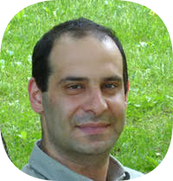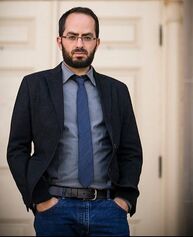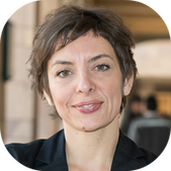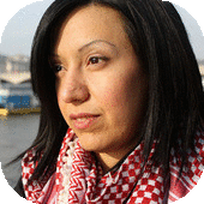Middle East Political Economy Summer Institute Network
SUMMER INSTITUTE PARTICIPANTS
2023 Workshop: Educators
Ziad Abu-Rish

Ziad Abu-Rish is Associate Professor of Human Rights and Middle East Studies at Bard College, where he also directs the MA Program in Human Rights and the Arts. His research explores state formation, economic development, and popular mobilizations in the Middle East, with a particular focus on Lebanon and Jordan. He is co-editor of both the Arab Studies Journal and Jadaliyya e-zine.
Max Ajl

Max Ajl is a Senior Fellow at in the Department of Conflict and Development Studies at Ghent University and a researcher with the Tunisian Observatory for Food Sovereignty and the Environment. He is an editor at Agrarian South and Journal of Labor and Society, and has written for Agrarian South, the Journal of Peasant Studies, Globalizations, Review of African Political Economy, Middle East Report, and many other scholarly and popular journals. He researches climate politics, Tunisian national liberation, agrarian politics in the Arab region, and Arab intellectual history. He has been active in anti-war politics and is the author of a recent book, A People’s Green New Deal.
Bassam Haddad

Bassam Haddad is Director of the Middle East and Islamic Studies Program and Associate Professor at the Schar School for Policy and Government and a core faculty member in the Philosophy, Politics, and Economics program at George Mason University. He is the author of Business Networks in Syria: The Political Economy of Authoritarian Resilience (Stanford University Press, 2011) and Co-Editor of Dawn of the Arab Uprisings: End of an Old Order? (Pluto Press, 2012). Bassam serves as Founding Editor of the Arab Studies Journal, a peer-reviewed research publication, and is co-producer/director of the award-winning documentary film, About Baghdad, and director of a critically acclaimed film series on Arabs and Terrorism, based on extensive field research/interviews. Bassam is Co-Founder/Editor of Jadaliyya Ezine and the Executive Director of the Arab Studies Institute, an umbrella for five organizations dealing with knowledge production on the Middle East. He serves on the Board of the Arab Council for the Social Sciences and is Executive Producer of Status Audio Magazine.
Omar Dahi

Omar S. Dahi is interim vice president for academic affairs and dean of faculty, as well as professor of economics at Hampshire College and a research associate at the Political Economy Research Institute at the University of Massachusetts Amherst. He is the founding director of Security in Context, a research network on peace, conflict, and international affairs. He has published in academic outlets such as the Journal of Development Economics and Applied Economics, Southern Economic Journal, Political Geography, Middle East Report, Forced Migration Review, and Critical Studies on Security. His last book was South-South Trade and Finance in the 21st Century: Rise of the South or a Second Great Divergence (coauthored with Firat Demir). Dahi serves as an associate editor of the Review of Social Economy as well as Co-Editor of the e-zine Jadaliyya and has served on the editorial committee of the Middle East Report. He is a founding member of the Beirut School of Critical Security Studies within the Arab Council for the Social Sciences (ACSS). Dahi has served as a lead expert on the United Nations Economic and Social Commission of West Asia's National Agenda for the Future of Syria program.
Muriam Haleh Davis

Muriam Haleh Davis is an associate professor of history at the University of California, Santa Cruz. Her research interests focus on questions of political economy, racial classification, and postcolonial studies in Algeria. She is the coeditor, with Thomas Serres, of North Africa and the Making of Europe: Governance, Institutions and Culture (Bloomsbury Academic, 2018). Her most recent book is Markets of Civilization: Islam and Racial Capitalism (Duke university Press, 2022).
Adam Hanieh

Adam Hanieh is Professor of Political Economy and Global Development at the Institute for Arab and Islamic Studies, University of Exeter, and Distinguished Research Fellow at the Institute of International and Area Studies (IIAS) at Tsinghua University, Beijing, China. His current research focuses on issues of political economy, oil, and capitalism in the Middle East. His most recent book is Money, Markets, and Monarchies: The Gulf Cooperation Council and the Political Economy of the Contemporary Middle East (Cambridge University Press, 2018), which won the 2019 British International Studies Association, International Political Economy Group Book Prize.
Pete Moore

Pete W. Moore is the Marcus A. Hanna Associate Professor of Politics at Case Western Reserve University in Cleveland, Ohio. From 2021-2022, he was the Visiting Kuwait Chair at the Paris School of International Affairs, Sciences Po. He serves on the editorial committee of the Middle East Report, the Middle East Studies Association’s Committee on Academic Freedom (North America), and helps direct research for the project, Security in Context. His research and publications explore issues of political economy, security studies, and fiscal politics with specific emphasis on Jordan and the Gulf States.
Jacob Mundy

Jacob Mundy is an Associate Professor and Director of the Peace and Conflict Studies program at Colgate University, where he also contributes to Middle Eastern and Islamic Studies. His field and archival work mainly focuses on organized violence and foreign intervention in conflicts in Northwestern Africa, specifically the Western Sahara dispute, the Algerian civil war, and the Libya crisis since 2011. His most recent article, "A Theoretical War: Accounting for American Imperialism in the Middle East," was published in the Journal of Labor and Society in 2023.
Sherene Seikaly

Sherene Seikaly is Associate Professor of History at the University of California, Santa Barbara. She held the Qatar Postdoctoral Fellowship at Georgetown University and the Europe in the Middle East Postdoctoral Fellowship at the Wissenschaftskolleg zu Berlin. Seikaly was Director of the Middle East Studies Center at the American University in Cairo (2012-2014), where she was awarded an Excellence in Teaching Award in 2014. Seikaly's Men of Capital: Scarcity and Economy in Mandate Palestine (Stanford University Press, 2016) explores how Palestinian capitalists and British colonial officials used economy to shape territory, nationalism, the home, and the body. Her forthcoming book, From Baltimore to Beirut: On the Question of Palestine focuses on a Palestinian man who was at once a colonial officer and a colonized subject, an enslaver and a refugee. His trajectory from nineteenth century mobility across Baltimore and Sudan to twentieth century immobility in Lebanon places the question of Palestine in a global history of race, capital, slavery, and dispossession. Seikaly is the recipient of the National Endowment for the Humanities Research Fellowship, the Distinguished Teaching Award from the Academic Senate, the University of California, Santa Barbara; the Harold J. Plous Award at UCSB; and the UC President’s Faculty Research Fellowship. She currently serves as co-editor of Journal of Palestine Studies and co-founder and co-editor of Jadaliyya.
Rafeef Ziadeh

Rafeef Ziadah is a Lecturer in Politics and Public Policy in the Department of International Development, King's College London. Her research focuses broadly on political economy, maritime infrastructures, gender and race, with a particular focus on the Middle East and East Africa. She holds a PhD in Politics from York University, Canada. Previously she was a Lecturer in the Politics and International Studies department, SOAS University of London and an ESRC Postdoctoral Research Fellow. Rafeef is co-editor (with Brenna Bhandar) of the book Revolutionary Feminisms (Verso press 2020). Her research on infrastructures and maritime politics has appeared in the journals Politics; Antipode; Conflict, Security & Development; International Journal of Urban and Regional Research; Environment and Planning D: Society and Space; among other venues.
Kareem Rabie

Kareem Rabie is Assistant Professor of Anthropology at The University of Illinois, Chicago. His work focuses on privatization, urban development, and the state-building project in the West Bank, and he is the author of Palestine is Throwing a Party and the Whole World is Invited: Capital and State Building in the West Bank, which came out May 2021 from Duke University Press.
Previously he was Assistant Professor of Anthropology at American University in Washington, DC; Harper-Schmidt Fellow at the University of Chicago; and Marie Curie Fellow/Senior Researcher at the University of Oxford Centre on Migration, Policy, and Society (COMPAS).
Kareem spent 2020-2021 on research leave supported by the ACLS, the Wenner-Gren Foundation, and the Graham Foundation for Advancement in the Fine Arts, and was a visiting fellow at CUNY’s Center for Place, Culture, and Politics; and Committee on Globalization and Social Change.
Previously he was Assistant Professor of Anthropology at American University in Washington, DC; Harper-Schmidt Fellow at the University of Chicago; and Marie Curie Fellow/Senior Researcher at the University of Oxford Centre on Migration, Policy, and Society (COMPAS).
Kareem spent 2020-2021 on research leave supported by the ACLS, the Wenner-Gren Foundation, and the Graham Foundation for Advancement in the Fine Arts, and was a visiting fellow at CUNY’s Center for Place, Culture, and Politics; and Committee on Globalization and Social Change.


